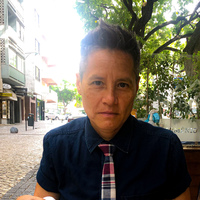Fiona Ngo
University of Virginia, American Studies, Faculty Member
- Fiona Ngô is a musician, experimental sound artist, and Associate Professor in the Department of American Studies at the University of Virginia. Ngô was the touring guitarist for Alice Bag from 2013-2017 and composes and performs soundsc... moreFiona Ngô is a musician, experimental sound artist, and Associate Professor in the Department of American Studies at the University of Virginia. Ngô was the touring guitarist for Alice Bag from 2013-2017 and composes and performs soundscapes for plays, performance art, and video installations. Ngô authored Imperial Blues: Geographies of Race and Sex in Jazz Age New York. “Punk Anteriors,” an issue of Women & Performance co-edited with Elizabeth Stinson, includes Ngô’s article “Punk in the Shadow of War,” and also co-edited an issue of positions: east asia critique on the theme of “Southeast Asians in the Diaspora.”edit
In this pathbreaking study, Fiona I. B. Ngô examines how geographies of U.S. empire were perceived and enacted during the 1920s and 1930s. Focusing on New York during the height of the Harlem Renaissance, Ngô traces the city's multiple... more
In this pathbreaking study, Fiona I. B. Ngô examines how geographies of U.S. empire were perceived and enacted during the 1920s and 1930s. Focusing on New York during the height of the Harlem Renaissance, Ngô traces the city's multiple circuits of jazz music and culture. In considering this cosmopolitan milieu, where immigrants from the Philippines, Cuba, Puerto Rico, Mexico, Japan, and China crossed paths with blacks and white "slummers" in dancehall and speakeasies, she investigates imperialism's profound impact on racial, gendered, and sexual formations. As nightclubs overflowed with the sights and sounds of distant continents, tropical islands, and exotic bodies, tropes of empire provided both artistic possibilities and policing rationales. These renderings naturalized empire and justified expansion, while establishing transnational modes of social control within and outside the imperial city. Ultimately, Ngô argues that domestic structures of race and sex during the 1920s and 1930s cannot be understood apart from the imperial ambitions of the United States.
Research Interests:
Considers transnational subject formation through an analysis of Tran Thi Kim-Trang's Ekleipsis, a short video that takes hysterically blind Cambodian women as its topic. This article utilizes disability and queer theory to argue against... more
Considers transnational subject formation through an analysis of Tran Thi Kim-Trang's Ekleipsis, a short video that takes hysterically blind Cambodian women as its topic. This article utilizes disability and queer theory to argue against the desire for citizenship.
Research Interests:
Research Interests:
Argues for transnational racial formation of mixed-race Vietnamese subjects in the documentary film Daughter from Danang.
